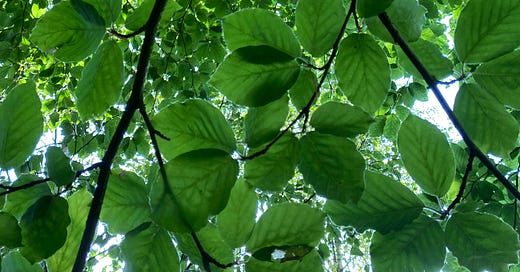It was a real pleasure to contribute to the Digital Transformation Lab & Cork University Business School lunchtime session hosted by Gráinne Bagnall "Rekindling our Relationship with Nature in the Future of Work"
This edition of Regen-Notes is the transcript of my talk. The recording of the event, with awesome contributions from Lorna Ross, Annalisa Setti and Roisin Byrne should be available soon.
Grainne - a huge thanks for the invitation to participate in this timely Digital Labs event. I am joining you from the beautiful Forest of Bowland, in Lancashire, NW England. I took the opportunity, between rain showers this morning to sit under our Beech tree to compile thoughts for this talk. I recall you mentioning your Beech tree in Cork as part of your forest bathing events, so there is a nice connection there. We may be in different countries but we are connected through the digital mycelium of zoom!
Preview of the World
The pandemic lockdown has shown what’s possible - when being contained in our homes, on our 1-hour exercise, we sought nature.
And we were treated to a preview of what the world could look like, we shared, we watched sunsets in awe, we listened to a world of silence, to bird song, free from the hum of transport, we were amazed at how nature, deer, birds, reclaimed our streets.
In every walk in nature, one receives more than one seeks - John Muir 1877
Arundhati Roy writing in the Financial Times in 2020 likened the pandemic to a portal - giving us a chance to leave behind the bad and take through the good - the world we should like to see - but that wouldn’t happen without fighting for it.
And now, as we emerge from the Covid portal, and as we shift to a new normal - or rather the old normal rebadged- are we failing that wonder?
We now have a period of uncertainty - a hybrid balance of working both at home and in the office, of not liking travel, by car or public transport, of worry, of angst, of real concern, for not only the future of work, but the future of our air, and our planet.
Three of the most important issues of our time, climate crisis, ecological crisis, mental health crisis have one thing at their heart: the relationship between people and nature.
And, if we talk about a future that is ecologically robust, culturally rich and socially just, as the Living Building Challenge does, then our relationship with nature is very much at the heart of what we do.
Erich Fromm back in 1968, with the first use of the word biophilia, described biophilia as the love of life and all that is living – as hope, as an antidote to helplessness and disorientation antidote to despair - how very pertinent to our times here in 2021.
The question, however, is how do we bring our responses and feelings when being in nature into our buildings and workplaces? The awe of a sunset, the mystery of the bird call, the frisson of the bear or cougar ahead on the track, the sensation of a summer rainstorm, the wonder of mosses, the thrill of buzzards and eagles soaring.
Nature though is not always friendly and pleasing, nature is Storms and Starlight, represented in the patterns of biophilia as refuge and prospect, mystery, risk and peril, awe and frisson.
In FutuREstorative, I described connecting with nature & biophilia as the secret sauce of sustainability as a means of improving our sustainability practices and behaviours.
Stephen Kellert, often called the godfather of biophilia, described biophilic design as being about our values and ethical responsibility for the care and sustainability of the natural world.
We spend 90% of our time in buildings, furthermore only 19% of us spend any meaningful time in nature.
We talk of smart buildings and smart cities, aligned with an internet of things, yet we rarely talk of the internet of nature. How giving access to nature, celebrating, learning from, listening to, can be a powerful force in the future of work and being human. After all, connecting with nature is about emotion, feeling and reciprocating.
Many will be familiar with Henry David Thoreau’s On Walden Pond - his 1854 account of spending time in a cabin in New England, isolated, in nature, to get away from the stress of life.
So, I would like to finish for now by mentioning Walden Zone’s - the place where we go to disconnect from stress, social media buzz, the noise of current life, to be quiet, be mindful, to be in nature, to be grounded.
A wonderful example of this is construction projects in London that have included, within their inductions, advice for operatives to find green and quiet locations to eat lunch, or simply space to get away from the noise and stress of working on construction.
Where is your Walden Zone?
What zone do you provide for those who work, live and play in your building.
About Regen-Notes
Regen Notes is a newsletter of regenerative news, stories and more, curated by Martin Brown. It is a companion to Zoom Regenerative, where we join the regenerative dots, share the themes and work that invigorates, inspires and feeds our curiosity.
Regen Notes is 100% reader-funded. If you value independent regenerative curation and journalism, please consider supporting as a free or a paid subscriber.
Zoom Regenerative.
Zoom Regenerative is a global conscious collective that, like a forest web of life, reciprocates and invigorates, nurtures and heals, cross-pollinating regenerative practices for a healthy, thriving future.
We live on planet earth, locally.
Join us for our next online session on 19th October.
Storms and Starlight
Title inspired from the Garston Rebuffat’s 1954 alpine classic Starlight and Storm. The expression also popped up in Alex Roddie’s wonderful The Farthest Shore.





